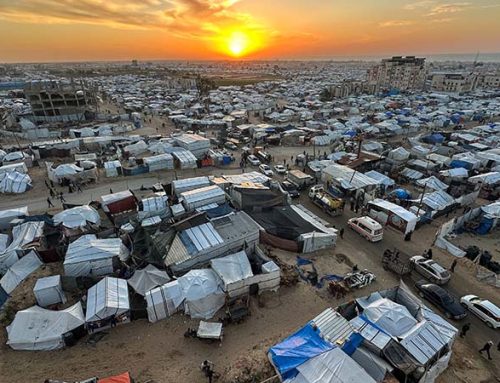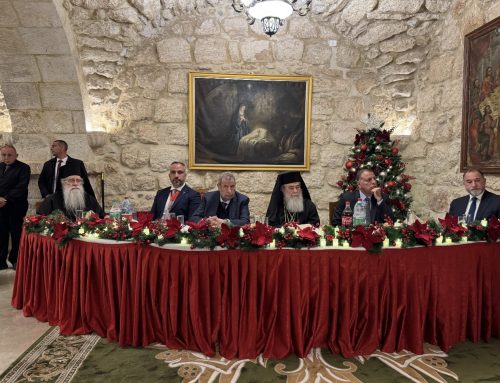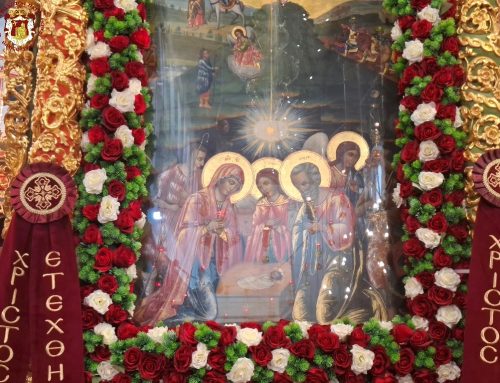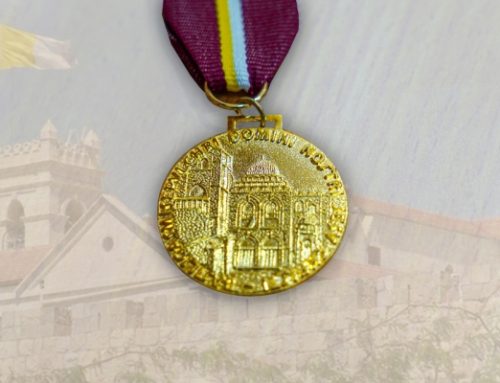CLEVELAND — A recent note from India let Msgr. John E. Kozar know he still brings smiles to people’s faces in faraway lands.
It all has to do with howling like a wolf.
The note said the people were asking about the white-haired man “that made us smile and taught us to howl,” said Kozar, president of the Catholic Near East Welfare Association/Pontifical Mission for Palestine.
It was more than a decade ago when Kozar howled before 2,000 Nepalese children in a camp for displaced people in India. At the time he was national director of the Pontifical Mission Societies in the United States. He howled, he explained, to get the kids’ attention so he could share a simple message about the cross and the love of Jesus.
The howls were something camp residents remembered and the recent note from the director of the CNEWA/PMP’s office in India wanted Kozar to know he wasn’t forgotten.
Kozar continued howling during the nine years he has served as CNEWA/PMP president when he shared his pastoral message in places such as Ethiopia, Eritrea, Jordan and the Palestinian territories.
The 74-year-old priest will take those memories with him into retirement June 30.
His plan is to return to his hometown of Pittsburgh, where he grew up in a Croatian American family and was ordained in 1971. His exact landing place is not yet known, although he told Catholic News Service he hopes to settle in a parish eventually.
Such a setting would fit the longtime “parish priest on loan to the missions.”
“My bishop is there, my brother priests are there and I have a few family members there,” he said of returning home.
Kozar’s future ministry role in Pittsburgh remains uncertain as well. He is nine months past a kidney transplant and continues to recover. He said he must be careful to avoid exposure to any illness, especially COVID-19, which is caused by the novel coronavirus that has swept around the globe.
What he does know is that he will miss seeing the people in the countries CNEWA/PMP serves in the Middle East, northeastern Africa, Asia and the Caucasus region. As an agency of the Holy See, CNEWA/PMP works for, through and with the Eastern churches in those areas to address pastoral needs and deliver humanitarian aid.
“I will recall with great humility the wonderful example of faith of the poor, the downtrodden, the oppressed that I went to visit in the name of the Holy Father, the universal church,” he said. “This is where I was humbled. Their faith and even their sense of hope uplifted me. It was like a reverse evangelization.”
Kozar described many of the people, whom he said often were marginalized because they were poor, as having a hunger for the Christian faith, with the “fire of wanting to know Jesus closely, more intimately.”
He recalled a visit to Iraqi villages that the Islamic State had overrun during the high point of its insurgency, killing Christians because they had a cross on their home as a witness to the faith. When the Christians returned, so did the crosses.
“That just knocked me over time and time again,” he said. “I had my theology made real by visiting with these people who have endured so much. And they still have smiles. They still feel that God has blessed them.”
He also credited Eastern Catholic Church leaders for their desire to be with the people experiencing suffering and loss while “sharing in the celebration of the cross and the victory of Jesus at Easter.”
“At CNEWA we seek to accompany the local churches. We don’t impose. We don’t tell them how to be a church. They know that better than anyone, and the people really help (the clergy),” he said.
During his time at CNEWA/PMP, Kozar was able to visit 11 of the 13 countries in which the organization is present. He said he regrets not being able to travel to Armenia and Georgia, where the organization had supported pastoral services. But everywhere else, from India to Ukraine, he paid a visit.
Kozar joined CNEWA/PMP in 2011 after serving for a decade as national director of the Pontifical Mission Societies, which also is responsible for the Society for the Propagation of the Faith, Society of St. Peter Apostle, Missionary Union and the Holy Childhood Association. He also served as a consultant for the Committee on World Mission Sunday of the U.S. Conference of Catholic Bishops and was a member of the Supreme Committee of the Pontifical Mission Societies in Rome from 2007 to 2010.
Prior to taking on a national role, Kozar held several positions related to missionary work with the Diocese of Pittsburgh beginning in 1978.
He said the missions called to him at a young age.
“The very first instance of a connection in my heart and soul with missions, maybe I was 10 or 12 years old in Catholic grade school,” Kozar recalled. “We would have once a year or twice a year a missionary visit. They were larger than life in my eyes.”
Kozar enrolled in the seminary with the goal of becoming a parish priest, but the missions called as well. At one point, he supported himself by working for four months in the Altiplano in Peru, one of the most wild and undeveloped areas on the planet.
The draw of missionary work had to be put on hold though as he cared for his parents as their health diminished. While taking care of them after ordination, he worked in the Pittsburgh diocesan mission office and made annual visits to the diocesan mission in Peru.
Building more and more experience in his diocesan ministry, Kozar became recognized nationally and internationally. Among those getting to know his work was New York Cardinal Timothy M. Dolan, chair of the board of trustees of CNEWA/PMP. When the organization needed a new leader in 2011, Dolan knew the priest from Pittsburgh was the right person for the job.
“Msgr. Kozar has the ‘smell of the sheep,’ because wherever there is trouble, persecution, hunger, or sickness throughout the worldwide church, you can expect to see the smiling face of John Kozar,” Dolan said in an email to CNS.
Even earlier, Kozar developed a keen sense of photography, having learned the craft from his father as a child. Those skills have helped over the years in the production of CNEWA’s ONE magazine, for which he served as publisher.
Kozar regularly provided contributions to articles and thoughts on the use of photographs in telling the stories of the lives and struggles of people in the countries CNEWA/PMP serves.
His support for quality journalism earned him the Bishop England Award from the Catholic Press Association in 2019. The award is the CPA’s highest honor for publishers.
Msgr. Peter Vaccari, former rector of St. Joseph’s Seminary in Dunwoodie, New York, will formally succeed Kozar July 1.
Kozar expects that during his continuing recovery from the kidney transplant, he will live the missionary life “vicariously.”
“I love geography and culture and all of that. I will recall and participate as much as I can. I can enjoy that whether I see something on the CNEWA website or another religious organization or congregation (website).”
Source: cruxnow.com






